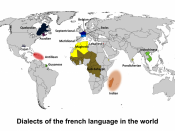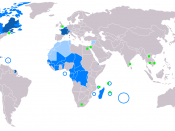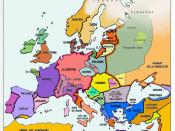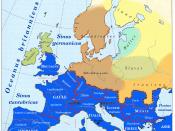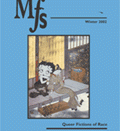God's Bits of Wood is a novel about a railway strike took place in Senegal which related to the strike in 1947 in history. The main cause of strike is the dissatisfactions of the work condition and employee benefits. The strikers wanted the same benefits as a railway worker in Europe. They tried to win back their benefits, such as the annual paid vacations, family allowances and the pensions from the European employers (wmich.edu). Through the struggle between the African strikers and their European bosses, this novel shows the awakening of the new nationalism of West Africa people and foreshows the independent of Senegal.
One important thing I want to point out from the novel is the conflicts between tradition and new development in the society, also the different opinion for the new technology between the elders and new generation during that time. First is the culture conflict, Niakoro, the female elder who has never accepted anything from the west.
In her opinion, the conflict between the Bambra and the French is set through language. She said in the book, "I have never heard of a white man who had learned to speak Bambara, or any other language of this country. But you rootless people think only of learning his, while our language dies." She is the first person in the book to make a choice between African and French cultures. According to Aguiar, "Her determination to speak only Bambara exemplifies both her traditional pride and her anticolonialist stance." An example of this is when her granddaughter spoke one word of French, and she was mad and disappointed.
Besides the culture difference, the different attitudes toward the new technology and the machine of the two generation are also another important issue. Even within the older generations, different opinion occurred. Elders like Niakoro, did not like the changes in the society and some other Elders like Mamadou Keita, is unsure whether the new machine is good or not. However, the difference is that Fa Keita believed that people should learn new thing and he accepted the fact that the roles of elders are changing in the society. He said to Niakoro in the book, "Even we old people must learn, and recognize that the things people know today were not born with us. No, knowledge is not a hereditary thing." What he meant is that, learning new things is not a bad thing because every one born without knowing anything, once we learned, we own. In addition, I want to talk about the opinion of the younger generations, which represented by the leader of the strike, Bakayoko. He and the people who work with him think that they should learn more about the machine because they think the new machine is the last hope. He said in the book "The kind of man we were is dead and our only hope for a new life lies in the machine, which knows neither a language nor a race" (76). In Bakoyoko's mind, the new machine is the only thing they can work with that did not care about their race and color. Another railway worker Tiemoko also said: "Only the engines we run tell the truth," "and they don't know the difference between a white man and a black" (8). This "truth" is the equation of freedom with objectivity rather than liberation through racial solidarity. The machine, which treats everybody the same, is also seen as a symbol of resistance against colonialism in the strikers mind (Aguiar). Bakoyoko also stated that,"We are driving a train down the track, and ahead of us we think we see an obstacle which makes us afraid. Are we going to stop the train and say to the passengers, "I can't go any farther; I think there is something up ahead that frightens me?" No-we are responsible for the train, and we must go forward and find out if the obstacle really exists." (175)In my opinion, Bakoyoko wants to tell other people the future is lying ahead on the tracks. Even though they did not know what is going to happen in the future, it is the only chance that they can find it out by learning and using the new machine. That is why the younger generations see the new technology and the machine as a good thing and put their hope into them.
Another thing which I think is important to discuss about is the relationship between the train and the French language. First, the arrival of the train is very similar to the French language that came with the colonizers. Same as putting French in the education system and force student to learn the language in order to study, the workers have to learn about the new machine in order to find a job. Besides, both the train and the language were from the west, which are new to the people compare to what they have originally known. On another hand, there is a big difference between the language and the train. Like Bakoyoko stated early, machine did not know the difference of race, color or language, but the language did show the difference of nationalities and race.
Finally, I want to talk about women's role in the novel. According to Gyasi "It can be said that if the strike is the brainchild of the laborer Bakayoko, the women are really the motivational force behind its success". In this novel, the strikers gain powerful allies from the women. Without the helps of women, this strike won't be succeed. In the beginning of the novel, the women did not know the details of the strike, they were only supporting the man by staying home to take care of the children and to find food. Only the Ad'jibid'ji, the daughter of Bakayoko's deceased brother have shown interest in the strike and ask her grandfather to take her to a meeting. However, later in the story, the women became more and more involved in the strike due to "starve out" plan from the French management. The French administrators decided to stop the strike by cutting off the local access of water and food. Therefore, women became a more important role in the family since they are the one usally go out to find food and feed the families. Soon after the "starve out" plan, the women started to participate in the strike and to see themselves as an active strikers. It is the first time the women knew that they can make a difference not only in their own lives, but also in their society. It is also the first time they began to make themselves as a part of the decision making processes in their communities. Among the women, Maïmouna, the blind woman, who always sings and give advice to the other women. In my opinion, she is a very important character in the story. According to Gyasi, "She is the only woman who appears throughout the novel: she appears early and is the last voice we hear at the end". The novel described her as this, "Even the men were beginning to complain. Only Maïmouna, her baby strapped across her back, walked steadily, humming one of her endless refrains."(200). She has the strength from both inside and outside. Even though she is not the leader of the women's march, her singing give the courage to the women to keep going, and not stop until the final victory. In the story, Oumane shows the role change of women in the society and most of all, he show people "a world in which women will be seen" (Gyasi).
In conclusion, I discussed the deferent conflict in the story, the different opinion from the two generation and the role of women in the society. This is not a novel about an individual man or woman's strengths and achievements, but the community as a whole. From the people involve in the strike, we learn that we can achieve anything if we working hard and work together with each other.
Work CitedAguiar, Marian . "Smoke of the Savannah." MFS Modern Fiction Studies 49(2003): 284-305.
"God's Bits of Wood." Colonial and Postcolonial. JULY 2001. Western Michigan University .
Gyasi, Kwaku . "From God's Bits of Wood to Smouldering Charcoal." French Colonial History 5(2004): 173-191.
Ousmane, Sembene. God's Bits of Wood. Heinemann, 1995.
Scott , Cynthia. "God's Bits of Wood by Sembene Ousmane." Colonial and Postcolonial. 18 September 2006. Associated Content. .
